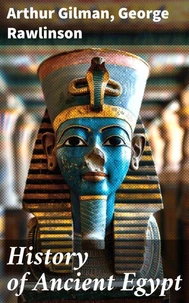The Story of Rome from the Earliest Times to the End of the Republic. A Comprehensive Journey Through Ancient Rome's Rise and Fall
Par :Formats :
Disponible dans votre compte client Decitre ou Furet du Nord dès validation de votre commande. Le format ePub est :
- Compatible avec une lecture sur My Vivlio (smartphone, tablette, ordinateur)
- Compatible avec une lecture sur liseuses Vivlio
- Pour les liseuses autres que Vivlio, vous devez utiliser le logiciel Adobe Digital Edition. Non compatible avec la lecture sur les liseuses Kindle, Remarkable et Sony
 , qui est-ce ?
, qui est-ce ?Notre partenaire de plateforme de lecture numérique où vous retrouverez l'ensemble de vos ebooks gratuitement
Pour en savoir plus sur nos ebooks, consultez notre aide en ligne ici
- Nombre de pages274
- FormatePub
- ISBN406-4-06-619818-3
- EAN4064066198183
- Date de parution11/12/2019
- Protection num.Digital Watermarking
- Taille715 Ko
- Infos supplémentairesepub
- ÉditeurGOOD PRESS
Résumé
In "The Story of Rome from the Earliest Times to the End of the Republic, " Arthur Gilman presents a comprehensive narrative that delves into the rich tapestry of Roman history, meticulously chronicling its evolution from a fledgling settlement to a dominant republic. Gilman employs a clear and engaging literary style that blends historical accuracy with a vivid storytelling approach, making the complex political and cultural dynamics of ancient Rome accessible to both scholars and general readers.
His meticulous research situates the text within the broader context of 19th-century historiography, reflecting a growing interest in nationalism and the politics of democracy during that era. Arthur Gilman, an esteemed American historian and writer, was deeply influenced by the intellectual currents of his time, including the fascination with classical studies and the influence of the Romantic tradition.
Gilman'Äôs academic background, coupled with his passion for historical narratives, allowed him to approach Roman history not merely as a series of events but as a profound exploration of human civilization. His works illustrate his belief in the lessons history teaches us about governance, society, and moral responsibility. This book is highly recommended for anyone interested in history, particularly those who wish to grasp the foundational elements of Western civilization.
Gilman's accessible prose, wealth of detail, and insightful analysis render this work an essential read for students, history enthusiasts, and anyone intrigued by the grandeur and complexity of Roman society.
His meticulous research situates the text within the broader context of 19th-century historiography, reflecting a growing interest in nationalism and the politics of democracy during that era. Arthur Gilman, an esteemed American historian and writer, was deeply influenced by the intellectual currents of his time, including the fascination with classical studies and the influence of the Romantic tradition.
Gilman'Äôs academic background, coupled with his passion for historical narratives, allowed him to approach Roman history not merely as a series of events but as a profound exploration of human civilization. His works illustrate his belief in the lessons history teaches us about governance, society, and moral responsibility. This book is highly recommended for anyone interested in history, particularly those who wish to grasp the foundational elements of Western civilization.
Gilman's accessible prose, wealth of detail, and insightful analysis render this work an essential read for students, history enthusiasts, and anyone intrigued by the grandeur and complexity of Roman society.
In "The Story of Rome from the Earliest Times to the End of the Republic, " Arthur Gilman presents a comprehensive narrative that delves into the rich tapestry of Roman history, meticulously chronicling its evolution from a fledgling settlement to a dominant republic. Gilman employs a clear and engaging literary style that blends historical accuracy with a vivid storytelling approach, making the complex political and cultural dynamics of ancient Rome accessible to both scholars and general readers.
His meticulous research situates the text within the broader context of 19th-century historiography, reflecting a growing interest in nationalism and the politics of democracy during that era. Arthur Gilman, an esteemed American historian and writer, was deeply influenced by the intellectual currents of his time, including the fascination with classical studies and the influence of the Romantic tradition.
Gilman'Äôs academic background, coupled with his passion for historical narratives, allowed him to approach Roman history not merely as a series of events but as a profound exploration of human civilization. His works illustrate his belief in the lessons history teaches us about governance, society, and moral responsibility. This book is highly recommended for anyone interested in history, particularly those who wish to grasp the foundational elements of Western civilization.
Gilman's accessible prose, wealth of detail, and insightful analysis render this work an essential read for students, history enthusiasts, and anyone intrigued by the grandeur and complexity of Roman society.
His meticulous research situates the text within the broader context of 19th-century historiography, reflecting a growing interest in nationalism and the politics of democracy during that era. Arthur Gilman, an esteemed American historian and writer, was deeply influenced by the intellectual currents of his time, including the fascination with classical studies and the influence of the Romantic tradition.
Gilman'Äôs academic background, coupled with his passion for historical narratives, allowed him to approach Roman history not merely as a series of events but as a profound exploration of human civilization. His works illustrate his belief in the lessons history teaches us about governance, society, and moral responsibility. This book is highly recommended for anyone interested in history, particularly those who wish to grasp the foundational elements of Western civilization.
Gilman's accessible prose, wealth of detail, and insightful analysis render this work an essential read for students, history enthusiasts, and anyone intrigued by the grandeur and complexity of Roman society.



